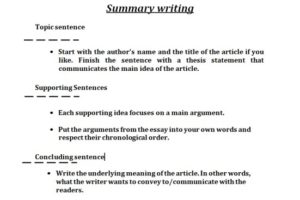Writing a summary
One MISTAKE that a lot of teachers and educators make is that they assume summary writing is easy, and that all students can do it on their own. This is clearly seen in the given assignments that relate to “reading and writing a summary about a text, an article, a movie”. Although the word summary might appear to be self-explanatory, it is not as simple as that. It is an academic skill that requires training and specific sub-skills from students.
What is summarizing?
To summarize means to write a summary. A summary is defined as a brief account of the main ideas of something (it can be a text, video, movie…etc. Summarizing is a technique that requires condensing ideas, examples, and details of a large and unconcise text into a short and abridged text. Summarizing is a powerful strategy that increases understanding of the text and retention of information. When students write a summary (summarize), they should focus on only the main points of a text using their own words.
The importance of a summary
Summarizing is a very important reading skill that helps students understand and learn the most important part of a text. 1) – It improves their reading comprehension skills and makes them able to remember and retrieve most of what they read. 2) – It is an academic skill that students are going to need in their academic journey, particularly in high school and high education. 3) – It develops students’ critical thinking skills as they become able to make decisions about what should be left in the text and what to remove. This is basically the most difficult part of summarizing. 4) – It improves students’ writing and editing skills and enhances their mastery and proficiency in the language.
What is the difference between summarizing and paraphrasing?
| Paraphrasing | Summarizing |
|
|
Summarizing skills don’t come out of anywhere. They require training and practice. When students are asked to summarize, they will just copy paste and they end up writing very long summaries. The problems students usually face when writing a summary are writing down every single piece of information of the original text, writing nothing of the original text, writing too much, or writing less than required.
Golden rules of summarizing
- Remove the things that don’t really matter such as examples
- Focus on the main ideas.
- Remove the things that are redundant and already repeated.
- Select or write a new topic sentence
- Make sure you paraphrase
General steps to write a summary
- Read the text twice
- Reading the text to understand
- Underline the main ideas
- Underline keywords
- Highlight examples and details
- Removing additional and repeated ideas
- Keeping the same order of the original text
- Writing a new topic sentence
- paraphrasing
Summary writing guidelines

When writing a summary
As you write your summary, make sure of the following things.
- The length of your summary depends on the length of the original article; (usually 10% of the original article)
- Focus on the main point of the article; and
- Use your own words; avoid copying phrases and sentences from the article.
Evaluating your summary
After a summary is written, the following things have to be checked
Your summary is usually scored on the extent to which
- The main ideas are clearly stated,
- The important ideas are identified
- The summary is well paraphrased







